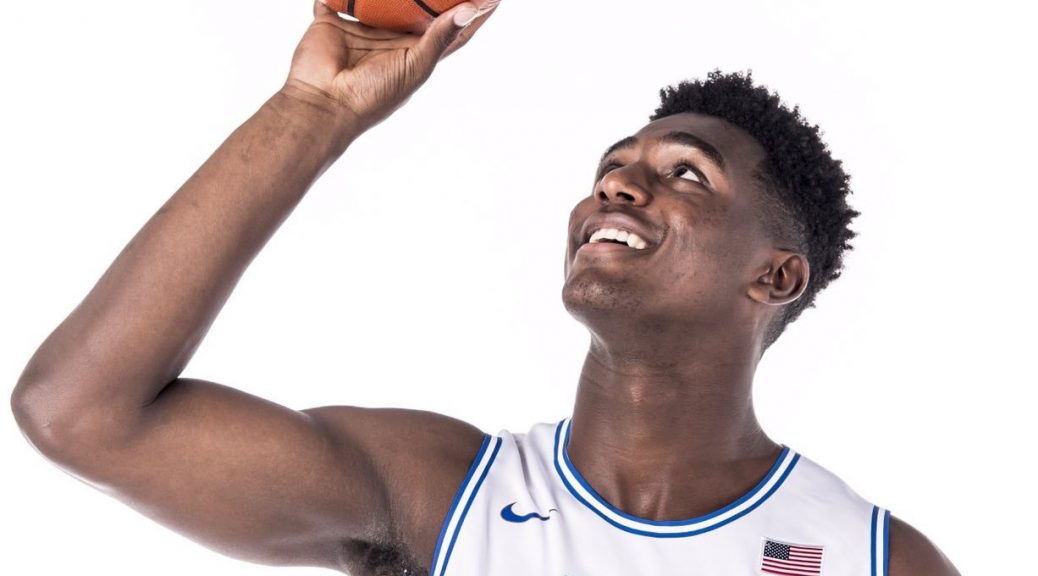
Category Archives: Duke Basketball

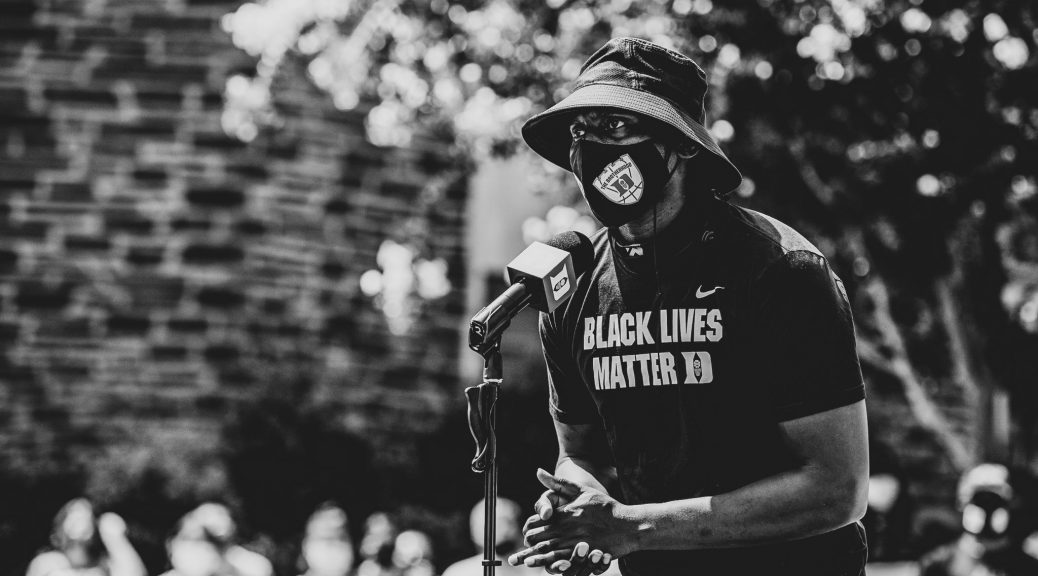
Duke University student-athletes held a peaceful protest
DURHAM, N.C. – Led by Duke men's basketball director of operations and player development Nolan Smith, Duke University student-athletes held a peaceful protest and conversation on campus Thursday bringing together hundreds of Blue Devil staff, student-athletes and coaches in support of the Black Lives Matter movement.
Smith addressed the crowd assembled on Krzyzewskiville, along with men's basketball head coach Mike Krzyzewski, women's basketball head coach Kara Lawson, men's basketball student-athletes Mike Buckmire and Henry Coleman III, and Mark Anthony Neal, a Duke professor of African and African American Studies.
"We're here today to talk about feelings," said Smith. "There are black student-athletes out here, there are white student-athletes out here and we all have feelings right now. Unless it's addressed, you keep it bottled up, and you can't keep it bottled up because all that does is create anger, and we're all angry, sad, frustrated and confused. We're here to talk about all that today.”
Smith connected with a number of students on campus to help amplify word of today's event via their personal social media accounts, including members of the men's and women's basketball teams, Elijah Williams, a men's basketball senior manager, and Brandon Hill, a redshirt senior on the football team and member of United Black Athletes on campus.
"I'm so proud of you, and of Duke Athletics," said Krzyzewski. "This is a time for all of us to be on the same team. Today is for all of us to acknowledge this problem and to share our feelings. All of you want to have your feelings and your voices heard. Today, I want you to listen. Over the last six months I have listened -- I've listened to my players, I've listened to people around the country. We can make a difference, and it can start here at Duke. As we express our feelings today, there need to be action items for all of us to do. The action item my team is going to take today, we're going to register to vote today."
“I wanted to thank everyone for being here today,” said Lawson. “And I wanted to give a little insight in to what it’s like to be an African American in this county. It’s very confusing at times. Because equality, in theory, is a basic principle. But in practice, for our country, it’s been very complicated. It’s been hard to rationalize. There’s a lot of anxiety involved in it, and those of you that are African American know what I’m talking about. Every day when you wake up, you feel anxious -- of every minute. Knowing that on your drive to school or your drive to work, going to a restaurant, sitting in your house or hanging out with your friends at a park, that that could be your last moment on earth.”
Following the demonstration, each member of the men's and women's basketball teams that had not already done so, used the website www.allintovote.org to register to vote.
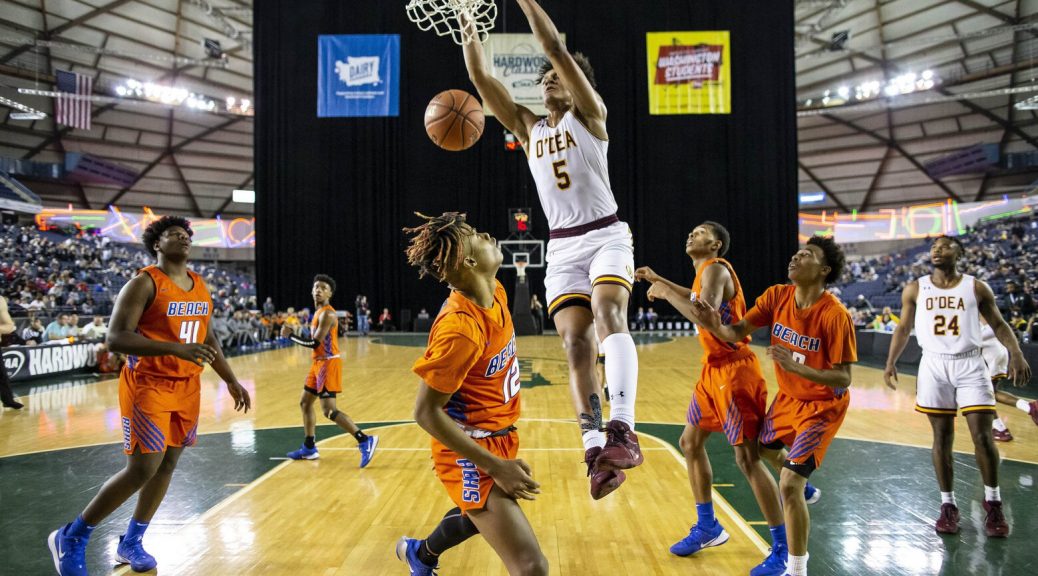
Paolo Banchero Highlights
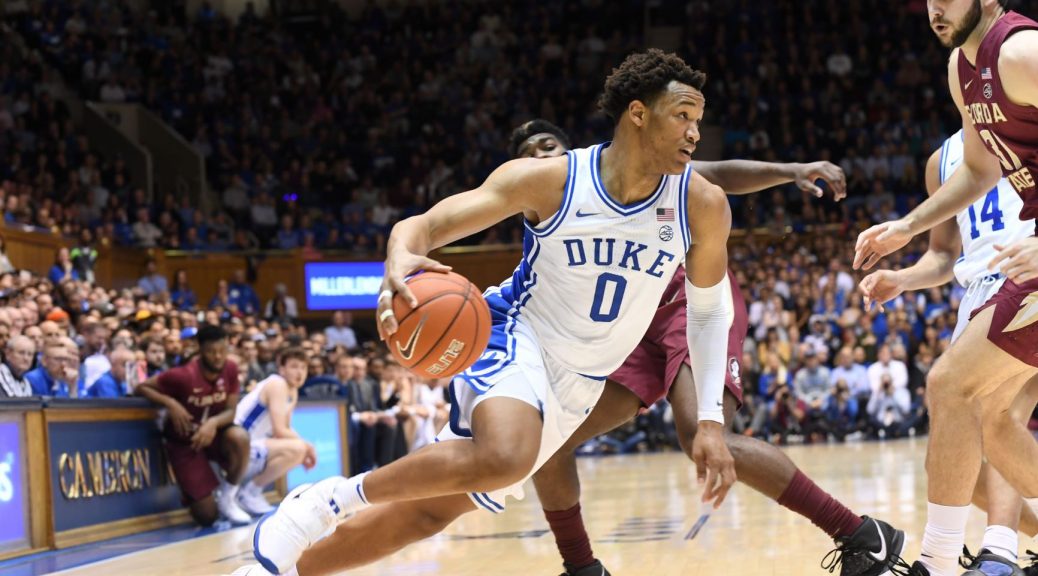
Wendell Moore Jr. A part of NABC Coalition
KANSAS CITY, Mo. — The National Association of Basketball Coaches (NABC) on Monday announced the formation of the NABC Player Development Coalition, a diverse collection of Division I men's basketball student-athletes that will provide valuable perspective and feedback on college basketball issues. Duke sophomore Wendell Moore Jr., is one of 11 selected to form the initial coalition.
In addition to creating a vehicle for student-athletes to address current issues, the Player Development Coalition will also provide members with numerous professional and personal development experiences. The coalition will meet quarterly and have regular opportunities to address the NABC Board of Directors and NCAA committees.
"I am honored to be named Duke's representative for the NABC Players Development Coalition," said Moore, a native of Charlotte, N.C. "This is a tremendous opportunity to have players' voices heard on the many pertinent issues facing college basketball. As a coalition, we are excited to become part of, not simply the recipients of the NCAA's decision-making process. We appreciate the NABC being forward-thinking in this regard. I am anxious to get started."
Members of the initial Player Development Coalition are North Carolina's Armando Bacot, Colorado's Evan Battey, Kentucky's Keion Brooks, Jr., Harvard's Kale Catchings, Villanova's Collin Gillespie, Gonzaga's Corey Kispert, Michigan State's Joshua Langford, Duke's Moore, TCU's RJ Nembhard, Syracuse's Bourama Sidibe and High Point's John-Michael Wright.
"Our priority as coaches is to support student-athlete development both on and off the court," said NABC Executive Director Craig Robinson. "As the NABC continues its advocacy and policy work on issues impacting our game, it's vital that input from student-athletes be central to those efforts. Whether it's NIL, transfer parameters, social justice, COVID-19 or a host of other important topics currently impacting college basketball, we will make sure student-athletes' voices are heard. We will also structure the Player Development Coalition to be an impactful experience that benefits these young men well beyond their college years."
2020-21 NABC Player Development Coalition Roster
Armando Bacot, North Carolina – So.
Evan Battey, Colorado – Jr.
Keion Brooks Jr., Kentucky – So.
Kale Catchings, Harvard – Jr.
Collin Gillespie, Villanova – Sr.
Corey Kispert, Gonzaga – Sr.
Joshua Langford, Michigan State – Sr.
Wendell Moore Jr., Duke – So.
RJ Nembhard, TCU – Jr.
Bourama Sidibe, Syracuse – Sr.
John-Michael Wright, High Point – So.

Duke Hoops Players Return to Campus
DURHAM, N.C. -- After the abrupt end to the 2019-20 season that saw both the ACC Tournament and NCAA Tournament canceled because of the COVID-19 pandemic, the Duke men's basketball team returned to campus Sunday to begin preparation for the 2020-21 campaign.
The players reported to the Washington Duke Inn where they underwent COVID-19 screening and checked into their rooms to begin a mandatory quarantine period. The team will meet with coaches and staff tonight via Zoom, and have other virtual meetings throughout the week with Duke Athletics staff to review academics, compliance, nutrition, behavioral health and other areas.
"It's exciting," said junior forward Joey Baker. "Obviously things are different and there are different guidelines we have to follow to keep everyone safe. But it's just great to be back around and see all the guys that I haven't seen in five months, meet the new teammates and hopefully get back to work pretty soon."
Later this week, the team is scheduled to begin individual medical testing to include MRI screening, biomechanical assessments and VO2 max testing, with combine testing set for the end of the week.
The Blue Devils welcome seven returnees and will introduce seven newcomers to the fold for the upcoming season – the program's 116th all-time and the 41st under Hall of Fame head coach Mike Krzyzewski. Sophomore forward Matthew Hurt (9.7 ppg, .393 three-point pct.), sophomore forward Wendell Moore Jr. (7.4 ppg, 4.2 rpg), Baker (5.0 ppg, .394 three-point pct.) and senior guard Jordan Goldwire (4.7 ppg, 2.3 apg) lead the list of returnees, while the incoming freshman class was ranked No. 2 nationally by ESPN.com.
Duke finished 25-6 in the abbreviated 2019-20 season and was ranked No. 11 in the final AP Poll and No. 8 in the final USA Today Coaches poll. The Blue Devils have been ranked in 83 consecutive AP Polls, the second-longest active streak in the nation.
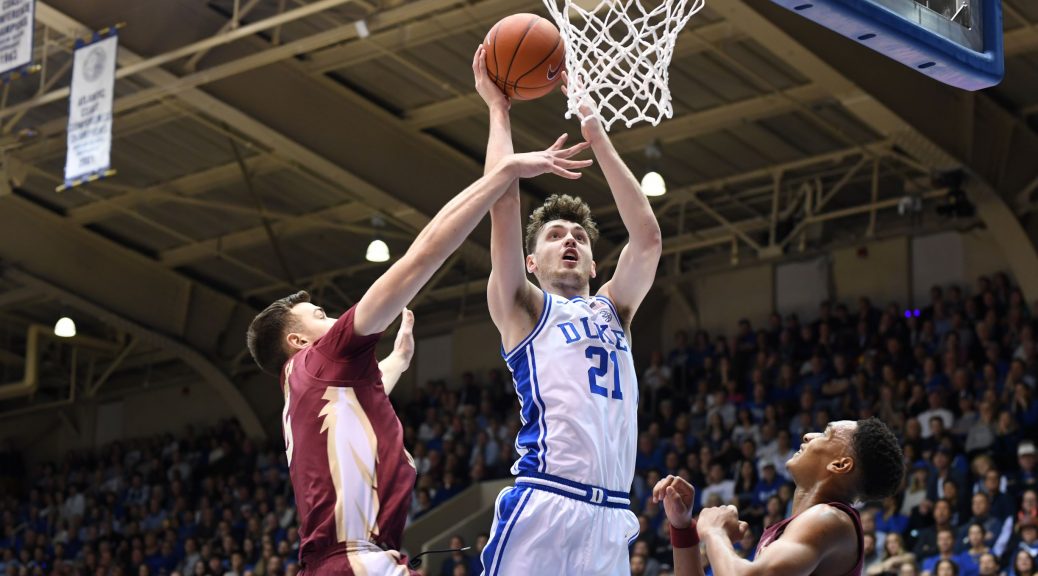
Update on COVID-19 Testing for Duke Student-Athletes
July 31, 2020
DURHAM, N.C. -- Duke University’s COVID-19 testing program has administered 700 tests to 309 student-athletes, coaches and staff in the first three weeks since student-athletes began returning to campus for voluntary practice.
As of July 31, 2020, nine student-athletes are in mandatory isolation due to positive COVID-19 tests. Sixteen others who earlier tested positive went through the required isolation period and have been cleared by physicians for return to regular activity. No coaches or staff have tested positive, and no teams have paused team-related activities due to testing results.
The majority of student-athletes testing positive were positive upon arrival. All were asymptomatic or experienced minor symptoms, and no student-athletes required additional medical care. Treatment consisted of symptom monitoring, rest and over the counter medication.
“We are foremost concerned for player safety, and with finding ways to balance the desire to have a vibrant athletic culture on campus, with the reality that COVID-19 is a highly transmissible infection,” said infectious disease specialist Cameron Wolfe MD, associate professor of medicine at Duke and chair of the Atlantic Coast Conference’s Medical Advisory Group for COVID-19. “To that end, an aggressive testing strategy is paramount -- identifying positive asymptomatic student-athletes, who may be capable of inadvertently transmitting the virus, is crucial. Duke is finding and isolating cases early in the season, prepared to quarantine when necessary, and by combining a regular batch testing program with multi-pronged mitigation strategies, we believe athletics can and will be successful at Duke.”
Duke’s testing programs follow the protocols set by the ACC COVID-19 Medical Advisory Group.
With undergraduate and graduate students returning to campus in August for the start of the fall semester, Duke has set up a comprehensive COVID-19 testing protocol which includes encouragement of testing and quarantining prior to traveling to Durham, mandatory testing on arrival before access to campus is permitted pooled community screening of students, faculty and staff, daily symptom monitoring, and an extensive contact tracing program. The University has set aside more than 300 beds to be used for quarantining on-campus students if necessary.
“Everyone must contribute to keeping COVID to a minimum on campus,” said Wolfe. “We will all need to be prepared to acknowledge the risks and wear masks and distance where we can; to be prepared to listen to contact tracing experts; and to be a part of our rigorous testing platform that will roll out across campus, as it has done for athletics. Things will feel very different. Regular testing and vigilance around health and safety protocols are going to be crucial for the fall semester to be successful and safe.”
Duke’s overall COVID-19 testing regimen includes the following steps:
· All students have been asked to self-quarantine for 14 days prior to arrival in Durham, and obtain COVID-19 tests, if possible, prior to arrival.
· All undergraduate, graduate and professional students will be tested before their Duke Cards will be activated, except PhD students who have been regularly coming to campus this summer for approved research. Students will have to sequester in their room or off-campus residence until their results are confirmed.
· All students residing in the Durham area will be required to complete a daily symptom-monitoring survey every day before coming to campus.
· Faculty and staff who visit campus regularly will have to complete the symptom tracking survey every day.
· Students who reside in Duke housing, who attend classes on campus or work on campus, and a number of faculty and staff, will be subject to regular pooled surveillance testing during the semester.
· Contact tracers will conduct notifications of those who may have been in close contact with someone whose test comes back positive.
In addition, all students, faculty, staff and visitors will be required to wear face coverings while on campus and observe other health-related guidelines for distancing and hygiene.